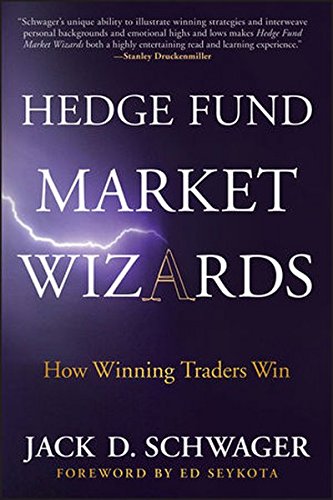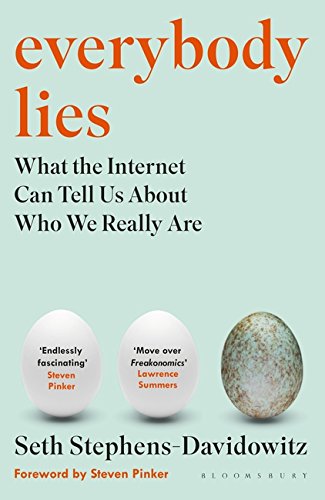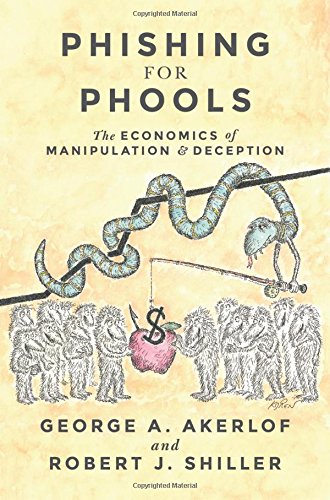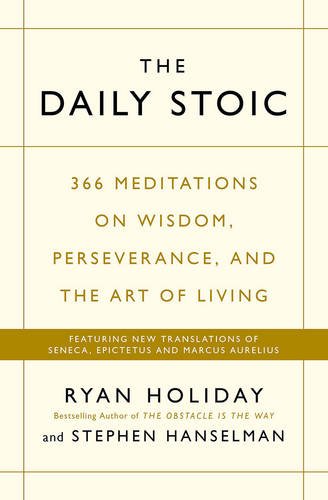Review: – Disclaimer: the German version comes as a trilogy, and I only read the first book about macro strategists, so technically this review only applies to one third of Hedge Fund Market Wizards. – Trading is easy now. Hundreds of online brokers and trading systems contend for your attention. Each one offers lower transaction fees, more professional analysis tools, better training videos and access to more exotic underlyings than the next. Trading consistently successful, however, is actually pretty hard. Like its predecessors (Market Wizards, New Market Wizards, and Stock Market Wizards), Hedge Fund Market Wizards, contains a series of interviews with successful traders. Author Jack Schwager, himself a recognized trading expert and fund manager, sat down with some of the top hedge fund managers to discuss their personal background and strategies. There is a lot more to trading than you would initially think. Some people trade systematically (using an algorithm to decide about trades), some are discretionary (using their intuition). There are trend followers (expecting a momentary trend to continue for some time) and those who expect a trend to revert to the mean. Some analyze fundamental market data, some just look at price charts. And I’m still taking…
Review: The Daily Telegraph Guide to Investing offers brief descriptions of investments, listed by risk category from pretty safe to high risk/reward assets. Discussed are standard investments like stocks, bonds and gold, but also more “wacky” physical assets like whisky, Lego sets and antique violins. What’s bad about The Daily Telegraph Guide to Investing? While Burn-Callander presents an illustrious variety of investment options, this is a rather slim book. Each investment option gets but a brief portrait, interested investors have to put in a lot of research to actually apply anything. Also, the book puts to much focus on rather obscure physical assets like red wine, Barbie dolls and comic books, that need tons of experience for even slightly accurate evaluations. Also, these kind of assets may be highly sought after by collectors now, but may be worthless in a few years. And even if they do accrue some value, all your profits are theoretical until you actually find someone to sell the thing to. Until then you get nothing and bear the full costs of ownership, like storage and insurance. The risk evaluation for each asset class is all over the place. Why is rental and let real estate…
Review: A good coffee should be dark, intense and rich in taste, right? That’s what you and me will tell when asked. Based on consumer research, coffee companies will create new coffee roasts that are extra dark and strong and full of flavour. Then you and me are going to completely ignore those and go buy something mild, probably with a lot of milk and sugar in it. Because everybody lies. There is a difference between action and intent. We may mean what we say, but we do not follow through. What we actually do is what we really, secretly and often subconsciously mean. That is why everybody lies. When we voice our preferences and opinions, even to ourselves, we are always feeling constraints to remove the edges, to be acceptable to others, to fit in. Even under absolutely no legal or moral restrictions we adapt our opinions to what we perceive to be the public opinion, an effect known as social desirability bias. Ultimately, Everybody Lies is a book about Big Data, and about revealing the truths by mining it. Stephens-Davidowitz brings colorful anecdotes from horse races, political campaigning, sex, marketing and other fields to illustrate the power and…
Review I try to review only books that were published in english, but I got this one for cheap and did not notice its language constraints until after I read it. So I thought, whatever. If the book had an english title it would be something along “The Art of Being an Egotist”. Enjoy. The phrase “egotist” is usually understood as an insult. Kirschner tries to put a positive spin on the word, defining it as a person who understands their own needs and capabilities and tries to gain maximum pleasure within this frame. This is an interesting parallel to the latest philosophical fad, modern stoicism. The difference is, that Kirschner does not prescribe a static ideal lifestyle to reach, but instead encourages the reader to evaluate and choose their goals. According to the author, everybody is an egotist anyway, but most people suppress their nature to please others. To the author, an egotist is taking responsibility for their actions and behaviors. Kirschner wants us to evaluate what we do for ourselves versus what we do for others. Do we pursue the career we want, or the career others want us to have? Do we buy luxury goods because we…
Review Apparently, a good portion of current economic theories and models are based on an idealized model of the free market, where consumers and companies have access to complete market information and only make rational decisions. As a scientist, I believe that models should describe reality in a simplified manner. Models can contain a fair amount of idealization (physicists have their pockets full of infinite rods and frictionless springs), but they are only useful if they allow predictions that can be verified in empirically. So let’s get back to the free market and look if everybody is rational and informed. Have you ever bought something you immediately regretted buying? Have you ever bought something and then found it cheaper somewhere else literally five minutes later? I did. How shocking! Sometimes, new paradigms of economic theory seem banal for normal people: we are paying too much for everything, because companies manipulate our information and desires, a process the authors refer to as “phishing”. Airport food is stupidly expensive, because we feel hungry after a long flight (or a long wait for the flight) and have no time to compare all alternatives. The same psychology made some savvy financial players make up…
Review Have you ever been to an evening event, and during polite conversation somebody suddenly steers the topic towards modern technology? And while everybody else is excitedly discussing the implications of the latest fad, you find yourself standing silently in a corner, because for you “Big Data” is your collection of adult movies on your harddrive? Do you need a shortcut to sounding like a technology “have”? This book got you covered. After steam engines, electricity and the computer revolution, Schwab sees the world in the middle of a new, fourth industrial revolution. While still based on computers, this new phase is characterised by the rapid saturation of society on all levels, and innovative use of technology. The author takes us on a tour through our modern world and highlights almost everything hot and new from the last couple of years, from 3D printing to gene sequencing, from drones to blockchain, from designer organisms to the internet of things. The nicest part is a brief overview of 23 disruptive technological trends with convenient good/bad/controversial bullet point lists, if you have too little time to read the full book. The author groups those trends into physical, digital and biological categories (because…
Review I used to associate the word “stoic” with absence of emotions and stubbornness. Apparently, I was wrong. A bit. Apparently it is all about having principles and concentrating on the things of life one can actually change (the circle of influence). Everything outside of this circle is neither good nor bad, just facts and circumstances, and one can live happily by developing an indifferent attitude towards them. The daily stoic comes in the format of an almanac, offering a short quotation by a famous greek stoic and an explanatory part offering interpretation and context. The idea is to read and meditate on a stoic teaching of the day everyday, but don’t worry, if you buy the book after January 1st you don’t need to wait a whole year to start. Although each moth has a central topic and three months are grouped around one of the key stoic principles (perception, action, will), the daily witticisms do not need to be read in order. The short format (maximum one page, sometimes only a few lines) is also makes this the ideal bathroom lecture. So Marcus Aurelius, Epictetus and Seneca, the most quoted stoics of the book, came from very different places…







